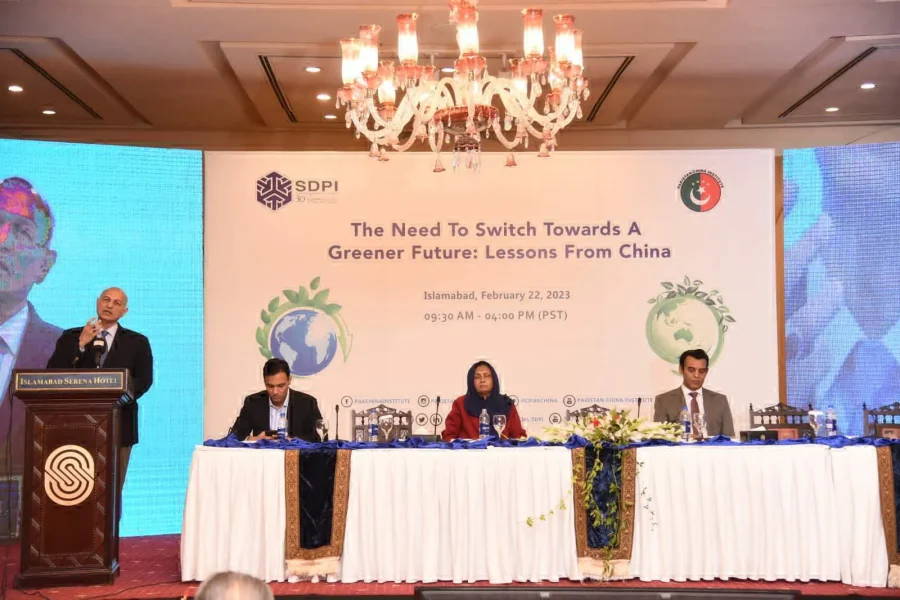China inspired Green Energy policy model can unlock investment potential in clean energy for Pakistan
Observer Report
Pakistan-China InstituteOBSERVER REPORT
Pakistan-China Institute and Sustainable Development Policy Institute hosted a high-level conference on “The need to switch towards a greener future: Lessons from China”. The conference featured insightful speeches by parliamentarians, industry experts and representatives from think tanks. Senator RukhsanaZuberi chaired the sessions, while Senator MushahidHussainSayed made the keynote speech. Senator MushahidHussainSayed in his welcome remarks said that “green is the defining element of China’s development agenda” and President Xi Jinping in COP 2015 Paris committed to carbon neutrality by 2060 and China is now emerging as a leader in green development. Today China is leading the world as producer and investor in green technology and finance.
He further informed that the shift to green technology has created additional 54 million ‘green jobs’ so far which shows the immense multifaceted potential of green development. He said that China is officially at par or has taken lead from USA in green technologies, AI, STEM, due to the commitment of China in innovation and technology.
Senator Eng. RukhsanaZuberi stressed on conducting energy audits to identify wasteful practices and increase the energy efficiency. She informed that after the first energy audit of the building of Pakistan Energy Council, 35% reduction in energy consumption was achieved. She stressed the need for advocacy and engaging with common people to increase energy efficiency at the household level by highlighting the financial cost that can be saved by making small consumption changes.
DrAbid Q. Suleri, the Executive Director, SDPI, said that we must recall success stories from China in tackling environmental and climate issues. He said that China successfully reduced SMOG and particulate matter air pollution by 60% in a short span in Beijing. He further elucidated that China’s Great Green Wall in 2013-14, was another initiative, which effectively management of desertification. He said that China offers a leadership model from micro to meso-level in managing resources efficiently, and addressing the growing threats of environment and climate change which Pakistan must take inspiration from.
Dr Zhao Baige, Vice Chair of the 12th NPC Foreign Affairs Committee, Chair of Advisory Committee of RDIinformed that China announced in 2016 its policy for carbon neutrality and has been committed to the achievement of the policy guidelines which is the reason behind China emerging as a global leader in renewables and emission reduction.
She stressed that Pakistan has immense potential for green development by promoting renewable energy. She said that Chinese enterprises are interested in investing in green development projects in Pakistan and there is much that can be achieved with commitment, cooperation and right policies. DrSajid Amin Javed, Deputy Executive Director, SDPI said that the green financing in Pakistan is still a residual policy and not a mainstream economic policy and stress first and foremost it must be made a main economic and financing policy.
ChristophNedopil, said that since 2022, there’s a much stronger willingness among Chinese companies to invest abroad in hi-tech sectors and is an area with immense potential which Pakistan can avail. He said that till 2019, China followed the host country’s environmental regulations in BRI construction and banking projects but that has changed significantly. He stressed on working with local communities to avoid resistance to development projects. He said that by 2030, all development projects under BRI must be green as per green development guidance.
Farid Ahmed, Group Chief, Corporate and Investment, Bank of Punjab said that Pakistan has 110,000MW potential in hydel, wind and solar energy and the government has announced under Alternative and Renewable energy Policy 2019, to increase the renewable energy share to 20% by 2025 and 30% till 2030.
Mujtaba Khan, CEO of Reon Energy said that our demand for solar technology has been increasing annually which in itself is an opportunity. However, government regulations complicate the process and discourage investors.
Mustafa HyderSayed, the Executive Director, Pakistan-China Institute in his concluding remarks stressed on establishing Special Economic Zone (SEZs) at strategic location to explore their true potential as simply mushrooming them is not enough. He said that Shenzhen emerged as the most successful model of Special Economic Zone is due to its strategic location in proximity to other business clusters.
Renewable energy can be expanded in Pakistan if they are made profitable and return on investment can be guaranteed. He called for adopting a synchronized approach to expand the renewable energy market and reduce the import bill for energy generation.










